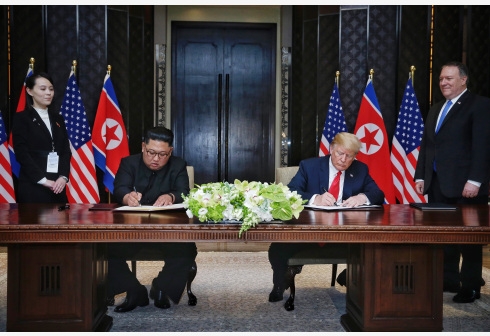


|
|
|
|
They met one on one for about 40 minutes, had an expanded
meeting joined by a few aides, and concluded their morning activities with a
working lunch.
The larger session of the meeting, which took place at the
Capella Hotel in Singapore's resort island of Sentosa, was attended by major
security and diplomatic aides to Kim and Trump.
On the DPRK side, Kim Yong Chol and Ri Su Yong, two vice
chairmen of the Workers' Party of Korea (WPK) Central Committee, and Foreign
Minister Ri Yong Ho were present.
Accompanying Trump were White House Chief of Staff John Kelly,
National Security Advisor John Bolton, and Secretary of State Mike Pompeo.
"Working together, we will get it taken care of,"
Trump said at the beginning of the expanded discussions, forecasting that he
and Kim will solve "a big problem and a big dilemma."
Kim said he will "cooperate with President Trump to resolve
the challenges ahead" and to overcome the skepticism and speculations
about their summit.
More officials took part in the working lunch, with the
additional participants on the US side, including White House Press Secretary
Sarah Sanders, National Security Council Senior Director for Asia Matt
Pottinger, and senior diplomat Sung Kim, who has led substantive talks with
Pyongyang into the summit.
Kim and Trump started their first summit with a historic
handshake before a row of the national flags of the two countries that lasted
for several seconds.
"This is just a new beginning," Trump said while
shaking hands with Kim.
Kim, dressed in a dark suit, and Trump, sporting a red tie,
talked in a corner of the hotel corridor for a few minutes before they walked
along the passage into the meeting room and sat down in front of journalists.
"The way coming here was not easy," Kim said.
"We had the past that grabbed our ankles and old prejudices
and practices that covered our eyes and ears. We are here after overcoming
all these," he said.
Predicting a tremendous success of the summit, Trump said it was
"an honor" to meet with Kim face-to-face and that he would have
"a terrific relationship" with the DPRK leader.
After shaking hands again with Kim in front of the cameras,
Trump gave a thumbs-up before starting the first meeting between an incumbent
US president and a DPRK leader.
Since taking over his country's leadership in late 2011, Kim had
made only three known trips to foreign countries before the Singapore visit.
He traveled to China twice and to the Republic of Korea (RoK) side of the
truce village of Panmunjom.
* US President Donald Trump said on June 12 the DPRK’s leader
Kim Jong-un had made an "unwavering commitment" to the complete
denuclearisation of the Korean peninsula but sanctions against DPRK would
remain in effect.
Trump, speaking after his historic summit meeting with Kim in
Singapore, said both leaders were "prepared to start a new history and
write a new chapter between our nations".
"He reaffirmed his unwavering commitment to the complete
denuclearisation of the Korean peninsula," Trump told a news conference.
Trump said Kim had "an opportunity like no other", and
that Kim had said a DPRK’s missile testing site "is going to be
destroyed very soon".
Trump also said he would be "stopping the war games",
apparently referring to unspecified military exercises.
Trump also said he and Kim had discussed human rights briefly.
* Following the US - DPRK summit in Singapore, many countries
applauded the political resolution made by the leaders of the two countries,
hoping it will establishing a peace mechanism for the Korean peninsula.
The RoK's President Moon Jae-in vowed on June 12 to write
"new history" with DPRK, praising DPRK’s leader Kim Jong-un's
decision to hold a summit with the US in Singapore.
"Leaving dark days of war and conflict behind, we will
write a new chapter of peace and cooperation," Moon said in a statement
released by his office.
China's foreign ministry said on June 12 that China will
continue to dedicate itself to establishing a peace mechanism for the Korean
peninsula.
Japanese Prime Minister Shinzo Abe welcomed the joint statement
signed by President Donald Trump and DPRK’s leader Kim Jong-un in Singapore
as a first step in the denuclearisation of DPRK.
"We see this as a step in a comprehensive resolution,"
Abe said in Tokyo.
Meanwhile, Russia has a positive assessment of the deal between
US President Donald Trump and DPRK’s leader Kim Jong-un, but "the devil
is in the detail", TASS news agency cited Deputy Foreign Minister Sergei
Ryabkov as saying on June 12.
Russia is ready to assist in implementing the deal - to work
towards complete denuclearisation of the Korean peninsula - and hopes
settling the nuclear crisis will unblock normal economic cooperation, RIA
news agency quoted Ryabkov as saying.
He also said Moscow hoped that six-party talks - a negotiation
format involving the two Koreas, the United States, Russia, Japan and China -
will at some point become relevant again, according to TASS.
|
Source: NDO